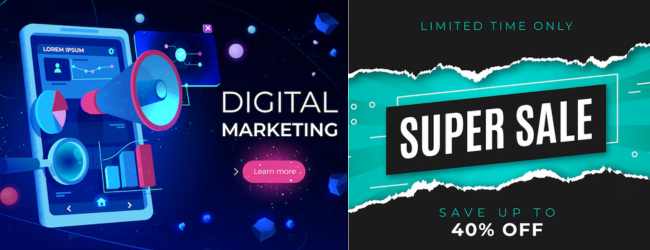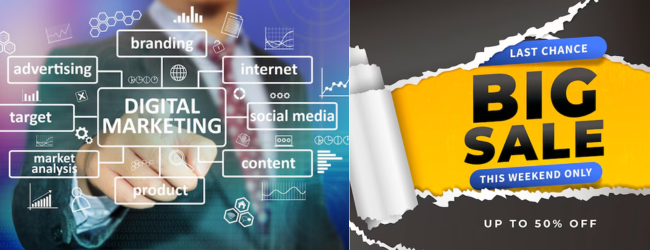Table of contents
Marketing has evolved drastically in the last decade. In 2025, small and medium-sized enterprises (SMEs) often face a common question: “Digital marketing vs traditional marketing: which one is better?” This detailed comparison will help you make the right choice by exploring each method’s cost, ROI, targeting capabilities, and effectiveness in a simplified and engaging format. Whether you’re a business owner, student, or marketer, this guide is tailored for easy understanding.

Comparison Table: Digital vs Traditional Marketing
| Feature | Digital Marketing | Traditional Marketing |
|---|---|---|
| Cost | Low to Medium (depends on platform) | High (TV, newspapers, billboards) |
| Reach | Global | Local to regional |
| ROI Tracking | Easy (real-time analytics) | Difficult to measure |
| Audience Targeting | Advanced (age, location, interests) | Limited |
| Engagement | Interactive (comments, shares, likes) | Passive (no immediate feedback) |
| Speed of Execution | Very fast (minutes to go live) | Slower (requires production & delivery) |
| Conversion Tracking | Real-time (clicks, leads, sales) | Estimations or surveys |
| Content Format | Blogs, videos, reels, social media, emails | TV, radio, newspapers, brochures |
| Eco-Friendly | Yes (paperless) | No (printing & paper waste) |
| Customer Feedback | Instant (online reviews, comments) | Delayed or indirect |
What is Traditional Marketing?
Traditional marketing refers to the conventional methods of promoting products or services through offline media.
Examples:
- TV & Radio ads
- Newspaper & magazine ads
- Billboards & hoardings
- Flyers & brochures
- Cold calling & direct mail
✅ Pros:
- Great for local audience targeting
- Builds brand credibility
- Tangible materials (brochures, print ads)
❌ Cons:
- Expensive for small businesses
- Hard to track ROI
- Minimal targeting options
- One-way communication
💡 Pro Tip: If you want to start a Business but have too many doubts, connect with a Business expert from Boss Wallah for guidance – Check Out
What is Digital Marketing?
Digital marketing involves promoting products or services using digital channels and the internet.
Examples:
- SEO (Search Engine Optimisation)
- Social media marketing (Facebook, Instagram, LinkedIn)
- Email marketing
- PPC (Pay-Per-Click Ads like Google Ads)
- Content marketing (blogs, videos)
✅ Pros:
- Highly cost-effective
- Detailed audience targeting
- Real-time performance tracking
- Easy to update campaigns
- Engaging and interactive
❌ Cons:
- Requires internet access and devices
- It can get overwhelming due to many platforms
- Algorithm changes can impact visibility
ALSO READ | Is Digital Marketing a Good Career Choice in India? Pros, Cons & Growth Explained
Why SMEs Are Shifting Towards Digital Marketing in 2025
1. Cost Efficiency
- A Google Ad campaign can start from ₹500/day.
- A full-page newspaper ad may cost ₹1,00,000+ for one day.
2. Measurable Results
- Google Analytics and Facebook Insights offer real-time data.
- You can track impressions, clicks, leads, and conversions instantly.
3. Targeted Advertising
- Run ads based on age, gender, interest, location, and even behaviour.
- Higher chance of reaching potential buyers.
4. Faster Launch & Testing
- Launch a campaign in hours.
- Run A/B tests to know what works best.
Statistics That Matter in 2025
- 81% of consumers research products online before purchasing.
- Digital ad spend in India is projected to hit ₹76,000 crore by the end of 2025.
- SMEs using digital platforms grow 2.5x faster than those using only traditional methods.
(Source: Statista, Dentsu India Report 2025)
ALSO READ | 10 Digital Marketing Trends to Watch in 2025
Choosing the Right Marketing for Your SME

✅ Go with Traditional Marketing if:
- You target an older audience with no internet access.
- You run a local store dependent on foot traffic.
- You have a large offline event or campaign.
✅ Choose Digital Marketing if:
- You want fast, scalable, measurable results.
- You have a tight marketing budget.
- You aim to reach customers beyond your locality.
📌 Smart Tip for 2025:
Combine both!
Use traditional marketing for brand awareness + digital marketing for lead generation and engagement. This hybrid strategy can boost your visibility across all touchpoints.
Need Expert Guidance?
Starting a business can be challenging, but you don’t have to do it alone! At Boss Wallah, our 2,000+ business experts are ready to provide valuable insights and guidance. Whether you need help with marketing, finance, sourcing, or any other area of any business, our business experts are here to help you succeed
Confused about Which Business to Start?
Want to start your own business but unsure which one to choose? Explore Boss Wallah, where you’ll find 500+ courses by successful business owners, featuring practical, step-by-step guides on starting and growing various businesses.
Find your perfect business idea today
Conclusion
In 2025, the battle of digital marketing vs traditional marketing is all about goals, audience, and budget. While traditional methods still have their place, digital marketing clearly offers more control, efficiency, and ROI, especially for SMEs. With India’s increasing internet penetration and smartphone usage, embracing digital is not optional anymore — it’s essential for survival and growth.
Frequently Asked Questions (FAQs)
Digital marketing uses online platforms, while traditional marketing uses offline methods like TV, print, and radio.
Digital marketing is generally more affordable and scalable for small businesses.
Yes, especially for local reach, events, and older demographics.
Absolutely. Digital marketing allows real-time tracking of leads, clicks, and sales.
Yes. A hybrid strategy often works best for reaching diverse audiences.
Yes. With rising smartphone penetration in rural India, digital channels like WhatsApp, Facebook, and YouTube are effective.
Google My Business, Canva, Mailchimp (free tier), Meta Ads Manager, Google Analytics.
SEO may take 3–6 months; paid ads can deliver results within hours or days.
Yes, many people still trust print ads, hoardings, and TV commercials as credible.
For SMEs, digital marketing offers significantly better ROI due to targeting, tracking, and lower cost.


